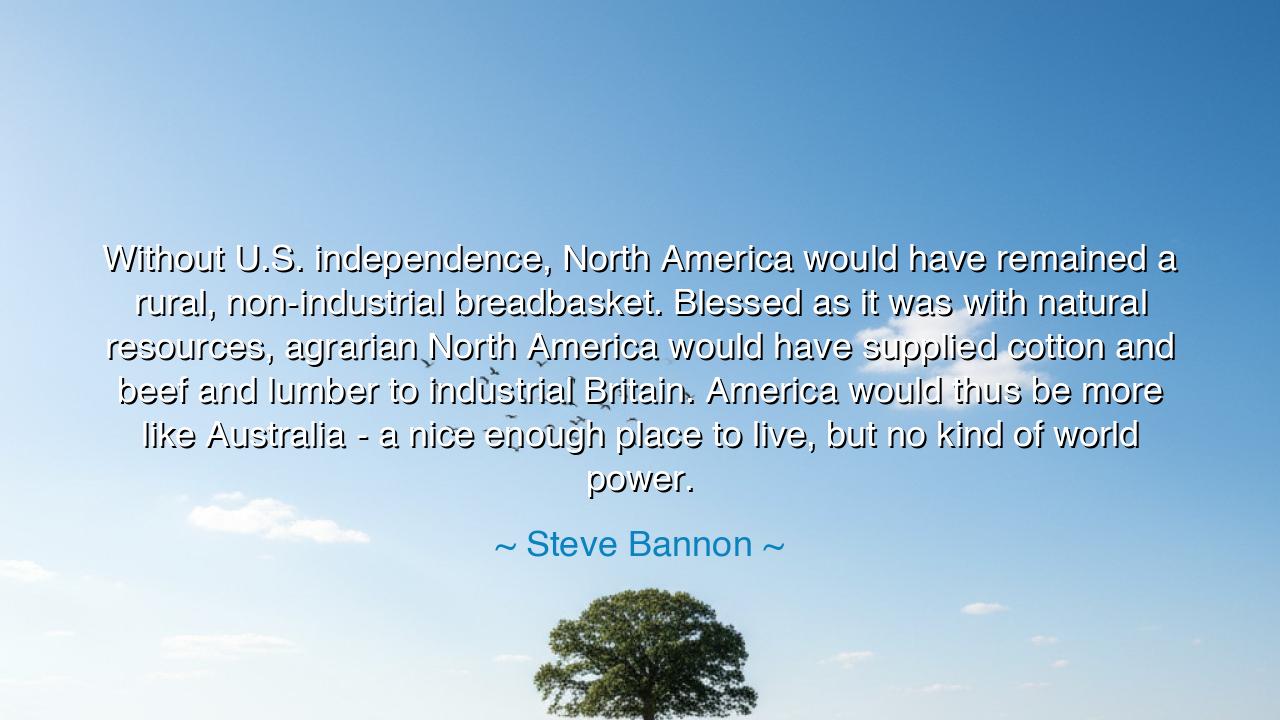
Without U.S. independence, North America would have remained a
Without U.S. independence, North America would have remained a rural, non-industrial breadbasket. Blessed as it was with natural resources, agrarian North America would have supplied cotton and beef and lumber to industrial Britain. America would thus be more like Australia - a nice enough place to live, but no kind of world power.






There are moments in history when a single act of independence reshapes the destiny of a people. The words of Steve Bannon, “Without U.S. independence, North America would have remained a rural, non-industrial breadbasket… America would thus be more like Australia — a nice enough place to live, but no kind of world power,” are not merely an observation of economics or geopolitics. They are a meditation on the transformative power of freedom, the truth that liberation does not only sever chains — it ignites creation. For a land rich in soil and timber is nothing without the spirit that dares to dream beyond them.
In the time before the American Revolution, the colonies of North America were indeed as Bannon described — agrarian, obedient, and bound by the laws of a distant empire. The land produced abundantly, yet its destiny was not its own. Its riches flowed across the sea, feeding the engines of industrial Britain, while the colonists themselves remained mere stewards of someone else’s prosperity. But the fire of independence, once lit in the hearts of men like Washington, Jefferson, and Franklin, transformed the humble farmer into a citizen and the colony into a nation. That act — born of courage and conviction — turned a passive land into a forge of power, where invention, enterprise, and ambition would shape the modern world.
Consider this truth: history has shown that the freedom to determine one’s own path is the seed of greatness. When people are ruled, they produce only what they are told to produce. But when they are free, they create what they imagine. Had America remained under British dominion, her vast plains might have been filled with cattle, not factories; her rivers might have carried barges of wheat, not ships of war or commerce. Independence did not merely give America a flag — it gave her purpose, and from that purpose came the engines, railroads, and ideas that carried her from wilderness to world stage.
There is a mirror to this lesson in the story of another empire — Rome. In her youth, Rome was but one city among many in the Italian hills, providing grain and soldiers to greater powers. But through her will and independence, she broke the chains of subservience and built her own destiny. She too became a world power, not by accident, but by the courage to stand apart. And yet, when that courage turned to complacency, when the Roman people forgot the sacred flame of self-determination, their empire too fell into decay. Thus, history whispers to every generation: freedom is not a gift once earned, but a fire that must be kept alive.
Bannon’s words remind us that resources alone do not create greatness. Many lands are blessed with rivers and mountains, yet remain stagnant because their people do not believe themselves capable of more. The difference between an agrarian dependency and an industrial power lies not in soil or iron, but in spirit — in the refusal to let another dictate the shape of one’s future. It was the Declaration of Independence, not the discovery of gold or oil, that made America great, because it unleashed the human will to build, to innovate, and to lead.
And so, my child, the lesson is not for nations alone, but for every soul. Independence is the root of all growth. To live under another’s command may bring comfort, but never greatness. Whether in life, in art, or in thought, one must dare to stand alone — to choose one’s own destiny rather than inherit it. For as with nations, so with people: those who remain dependent may live peacefully, but they will never shape the world.
Therefore, honor the spirit of independence wherever it burns — in nations, in ideas, in the quiet strength of those who refuse to submit. Remember always that the world’s greatest revolutions begin not on battlefields, but within hearts that dare to say, “I will not be ruled.” For only when a people — or a person — claims their own destiny can they transform from a mere breadbasket of potential into a power that changes history.






AAdministratorAdministrator
Welcome, honored guests. Please leave a comment, we will respond soon